




Still many view the Bible as a central source of information about ancient times. Therefore they ask the question: Are there traces of Atlantis in the Bible? This short article may help to get a reliable overview: Which opinions are academically discussible, and which are pseudo-scientific errors.
A basic error is to consider the Bible as a source of information on the most ancient times of humankind. In truth, vast parts of the Bible were written only very late (since the 6th century BC). For the question of Atlantis this is much too late!
| Chronology | (roughly rounded and estimated figures) |
| 11800 BC | Formation of Egypt (mistaken assumption of the Greeks) |
| 9600 BC | Atlantis? (mistaken assumption of Plato?) |
| 5600 BC | Flooding of the Black Sea basin |
| 3000 BC | Formation of Egypt / Invention of writing |
| 2600 BC | Building of the pyramids |
| 1800 BC | Writing of the Epic of Gilgamesh |
| 1600 BC | Volcanic eruption of Thera/Santorini |
| 1529 BC | Deucalion's Flood (mythical assumption of the Greeks) |
| 1430 BC | End of Minoan civilization |
| 1200 BC | Sea Peoples wars / Formation of the people of Israel |
| 800 BC | Formation of Tartessos |
| 722 BC | Northern kingdom of Israel destroyed by the Assyrians |
| 700 BC | Writing of the Homeric epics, Iliad and Odyssey |
| 640 BC | King Josiah: Begin of compilation of biblical scriptures |
| 626 BC | Foundation of the neo-babylonian empire |
| 590 BC | Solon in Egypt |
| 550 BC | Greek natural philosophers (Thales, Pythagoras, etc.) |
| 540 BC | Writing of the Bible in and after the Babylonian Exile |
| 525 BC | Cleisthenes founds democracy in Athens |
| 509 BC | Rome becomes a republic |
| 360 BC | Writing of the Atlantis dialogues |
According to science, the reliability of the biblical information approximately covers the time back to the 8th century, i.e. until the times of Tartessos and Homer. Concerning the times before, the Bible can offer only vague memories. But doesn't the Bible tell of the Hittites of the bronze age? No. The Bible knows only the late Hittie kingdoms which existed until 700 BC.
NB: According to Plato the Atlantis account is based on an Egyptian written source. If this is true, then the Atlantis account could contain more accurate information on ancient times than the Bible.

The biblical accounts of Paradise and Deluge are often paralleled with Plato's Atlantis. Because of the following reasons, this is an error:
a) Content and structure of the biblical accounts share similarities with the Atlantis account only at first glance. In truth they are totally different in content! Contrary to what most people think, Atlantis is not an utopian paradise, but only a rich society which becomes decadent because of its riches. Also, the Paradise, the Garden of Eden, was no island like Atlantis, and the Atlantean flood was a local flood, no world flood. According to Plato these floodings repeat again and again, where Deucalion's Flood is said to be the third flood after Atlantis. The biblical Deluge, however, happened only once and never again, and after the Deluge all sunken land became dry again. There is no talk of an Ark in Plato's text, etc. etc.
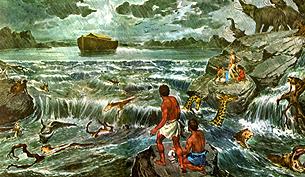
b) As is generally known the biblical stories of Paradise and Deluge are based on more ancient Mesopotamian myths. These in turn could indeed be based on a real "Paradise" destroyed in a real "Deluge", namely the basin of the Black Sea and its flooding. However, it must be noted that the Epic of Gilgamesh as well as the Bible provide only vague information, so that no correspondance to a real event can be determined with certainty.
But crucial for our question is the problem of the connection between the Mesopotamian tradition and Plato's Atlantis: On the one side we have vague memories of a "Paradise" and a "Deluge" long before the formation of Egypt and long before the invention of writing on the other side we have a detailed and written Egyptian account of an event which shows similarities only at first glance. And this event is dated after the formation of Egypt: Plato's 9000 years are after the errorneously assumed age of Egypt of ca. 11500 years, assumed errorneously by the Greeks in Plato's time. Both traditions differ we said it obviously in their contents. So, there is only one conclusion: The biblical tradition and the Atlantis account tell of two totally different events, they have nothing to do with each other.
Maybe the myth of Deucalion's Flood is related to the biblical myth of the Deluge, but Deucalion's Flood has nothing to do with Atlantis.
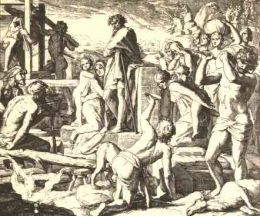
According to Genesis 4:17 Cain built the first city of humankind and named it after his son Enoch: "Cain lay with his wife, and she became pregnant and gave birth to Enoch. Cain was then building a city, and he named it after his son Enoch." Here, some might have seen a parallel to Poseidon who geologically prepared the later place of the city of Atlantis, a city, which allegedly was named "Atlantis" after Poseidon's son Atlas, and which allegedly was the first city of humankind. Here, the errors are towering up immensely!
First, there are several errors concerning Plato's Atlantis: This city was not named "Atlantis" and therefore it was not named after Poseidon's son Atlas. The word "Atlantis" is not a name but a grammatical form which in modern languages can well be emulated by the genitive: "of Atlas", or "Atlas' ...". Furthermore, Plato applies "Atlantis" always only to the island but not to the city. So, the Atlantis city is not named "Atlantis", and the island, too, is not named "Atlantis" but is only "the island of Atlas" or "Atlas' island". Only in the modern use it became usual to call the city just "Atlantis". It has to be noted, too, that Poseidon did not built any city but only geologically prepared the place for the later city. Also wrong is the assumption that Atlantis was the most ancient city of humankind, so to say the cradle of civilization. In Plato's account Atlantis is only one of several, independently founded cities which come into being and are destroyed again and again.
Concerning the Bible there are the following mistakes: The accounts of the Book of Genesis are no historical reports but classical myths. These myths try to explain, how the world, mankind and its civilization came into being. They are therefore also called etiologies, i.e. explanatory myths. More than vague and distorted memories of historical events cannot be expected from these myths. In case of Genesis 4:17 it is a myth trying to explain how urban civilization came into being.
In short: Who wants to view the city of Enoch in the Book of Genesis as Atlantis has to combine numerous errors on Plato's Atlantis and the Bible in order to end with this errorneous opinion.
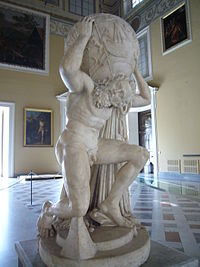
It is a popular fallacy to identify Noah's son Japhet with Iapetus, son of Uranus and Gaia and father of titan Atlas. And this titan Atlas is in turn identified with king Atlas of Atlantis. First, it makes no sense to identify a person of Hebrew mythology with a person of Greek mythology. Both persons play a very different role in their respective mythologies.
But it is wrong, too, to identify the Titan Atlas with king Atlas of Atlantis! Again, these two persons play a totally different role and contrary to popular belief are not identical, though this may be a surprise for many. The mistake to confuse these two is so deeply rooted that it occurs from time to time even in academic publications.

Since the kings of Atlantis are sons of a god and a mortal woman, some have concluded errorneously that the Book of Genesis 6:4 talks of the kings of Atlantis: "The Nephilim were on the earth in those days and also afterward when the sons of God went in to the daughters of humans, who bore children to them. These were the heroes that were of old, warriors of renown."
This of course is a conclusion without any foundation. In Greek mythology there are countless "sons of gods", shall they all be set in correspondance to Book of Genesis 6:4?! The giants of the Bible are the so-called Nephilim who have nothing to do with Atlantis.
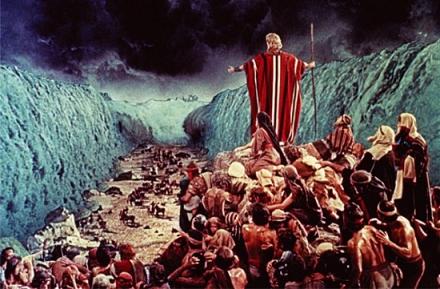
Some Atlantis hypotheses consider the Israelites to be descendents of Atlantis, as did already Eurenius 1754 or Baer 1762. But the people of Israel was formed only after the Sea Peoples wars from local tribes (Finkelstein/Silberman: The Bible Unearthed, 2001). This is too late to be brought into connection with Atlantis!
Furthermore, such Atlantis hypotheses are almost always ideologically, religiously or politically motivated and reveal their scientific insubstantiality by this, immediately. It has to be noted that there exists also the opposite, namely antisemitically motivated Atlantis hypotheses (cf. e.g. Pierre Vidal-Naquet: Atlantis, 2006).
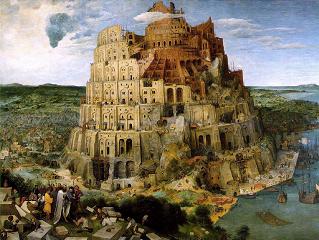
The city of Babylon has a many-fold symbolic meaning for the history of humankind: First, as the most known Mesopotamian city it is a symbol for the development of urban civilization in the course of the history of humankind. Secondly, by the biblical records Babylon became a symbol of decadence and arrogance which lead to decay. Because of this symbolism some identified Babylon with Atlantis.
But similar symbolism should not seduce to an identification. Babylon is not on an island, it is a quadratic, not a circular-shaped city, and the biblical myth of the Tower of Babel has no correspondance in Plato's Atlantis account. Indeed, Babylon is old enough for Atlantis but the Bible especially refers to the neo-babylonian empire 626-539 BC.
For adherents of the invention hypothesis Babylon is considered to be one of the models after which Plato allegedly invented the Atlantis account. But even under this perspective the similarities are much too vague in order to make reliable statements on the question.
The Bible, as a book of faith, was always a cause and source for the most unbelievable errors. Beginning with harmless historical misinterpretations, continuing with traditionalist dogmatism, up to cabbalistic speculations, there are errors of uncounted number. We already talked of Atlantis as a Paradise place of miracles. Sodom and Gomorrah are also favourite causes of mistakes. Or Jonah's whale: An Atlantean submarine?! With a sufficiently extended arbitrariness, you can view hints to Atlantis in all and everything; e.g. the Bible passage Job 26:5 is spooking through the internet as a passage on Atlantis: "The dead tremble those who live beneath the waters."
However, the Bible should not be underestimated: There could indeed be indirect hints to Plato's Atlantis in the Bible! The following considerations are based on academically proposed Atlantis hypotheses.
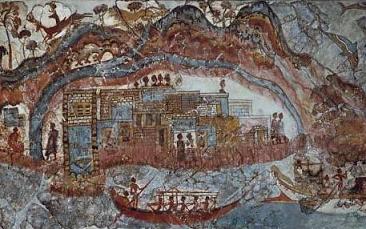
The Minoan civilization ended before the people of Israel came into being. Also the following Mycenaean civilization ended with the Sea Peoples wars in the very moment when the people of Israel started to form (Finkelstein/Silberman: The Bible Unearthed, 2001). The land Caphtor mentioned in the Bible is sometimes equalled with Crete, but in the Crete of biblical times there was no Minoan civilization any more.
However, in vague memories there could be traces in the Bible of the Minoan-Mycenaean civilization and of the volcanic eruption of Thera/Santorini. These vague memories then were taken over into the Bible from older traditions of other peoples, as we know it from the Deluge and the Epic of Gilgamesh. Some believe to recognize such vague memories in the Ten Plagues of Egypt (Exodus 7-11).
If the Minoan civilization was Atlantis (e.g. John V. Luce, Wilhelm Brandenstein), then these dark memories were traces of Atlantis in the Bible.
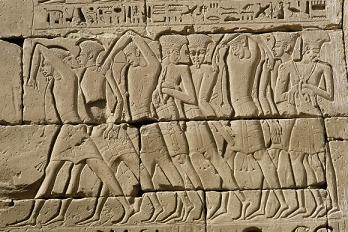
Academic Atlantis hypotheses often consider the attack of the so-called Sea Peoples on Egypt as the true background of Plato's Atlantis account (e.g. Wilhelm Christ, Spyridon Marinatos, John V. Luce, Herwig Gφrgemanns, and many others). These Sea Peoples wars are not mentioned in the Bible, but indirectly the Bible could talk of these events, in a two-fold way:
The people of the Philistines is generally considered to be one of the Sea Peoples which at the end of the Sea Peoples wars settled down at the Levant. If the Sea Peoples wars really were the historical background of Plato's Atlantis account, then the Philistines could be descendants of Atlantis.
Possibly prophet Amos knew a Philistine tradition on their descendence when he wrote: "Did I not bring up Israel from the land of Egypt, and the Philistines from Caphtor and the Syrians from Kir?" (Amos 9:7)
However, it has to be noted that the Sea Peoples were several peoples. Therefore it could well be that the Philistines were no Atlanteans but only allies of the Atlanteans.
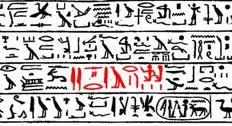
The turmoil of the Sea Peoples wars led to the formation of the people of Israel. Before the Sea Peoples wars there was a symbiosis of coastal urban dwellers at the Levant and nomadic tribes in the hinterland, who exchanged certain supplies. After the destruction of the coastal towns the tribes had to organize their supply on their own, so they settled down. By this process, it is said, the people of Israel came into being (Finkelstein/Silberman: The Bible Unearthed, 2001).
If the Sea Peoples really were led by the Atlanteans (whoever they were), then this would mean that the people of Israel indirectly owed its formation to the war of Atlantis against the peoples of the Eastern Mediterranean. This may sound like an odd thought, almost pseudo-scientific. But this is only due to the fact that "Atlantis" evokes mythical and dangerous pseudo-scientific associations. But when realizing that Atlantis as a part of the Mediterranean Sea Peoples would be a harmless, unspectacular and "normal" reality, Atlantis would be demystified, and the thought looses its odd sound.
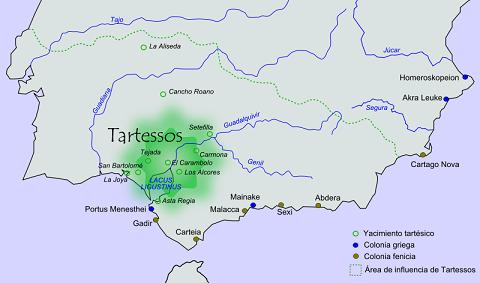
The question of whether the biblical Tarshish can be equalled with Tartessos in Spain is discussed controversially. If so, then it has to be noted that Tartessos could not have been a "real" Atlantis. Tartessos existed too late. Tartessos could only have served as a model for the invention of Atlantis, if Atlantis was an invention (e.g. Adolf Schulten).
Introductory works about Atlantis:
http://www.atlantis-scout.de/atlantis_introduction.htm
Book: The Bible Unearthed:
http://en.wikipedia.org/wiki/The_Bible_Unearthed
Video: The Bible Unearthed (4 x 50 min)
http://www.youtube.com/watch?v=gIpG0FUaXXE&list=PLB21B8E0D2D8EA963
http://en.wikipedia.org/wiki/Old_Testament#Composition
http://en.wikipedia.org/wiki/Japheth
http://en.wikipedia.org/wiki/Nephilim
http://en.wikipedia.org/wiki/Babylon
http://en.wikipedia.org/wiki/Minoan_civilization
http://en.wikipedia.org/wiki/Minoan_eruption
http://en.wikipedia.org/wiki/Plagues_of_Egypt
http://en.wikipedia.org/wiki/Philistines
http://en.wikipedia.org/wiki/Tarshish
Good page on Noah's Flood / the Deluge, by Robert Squillace New York University:
https://www.nyu.edu/projects/mediamosaic/curricularresources/FloodIndex.html